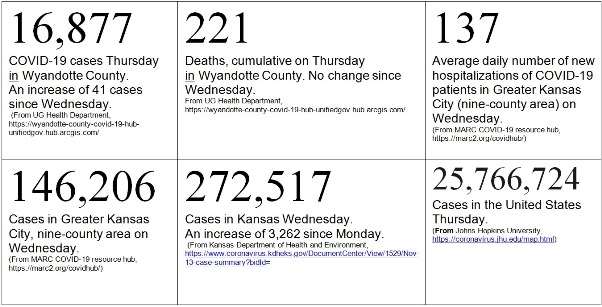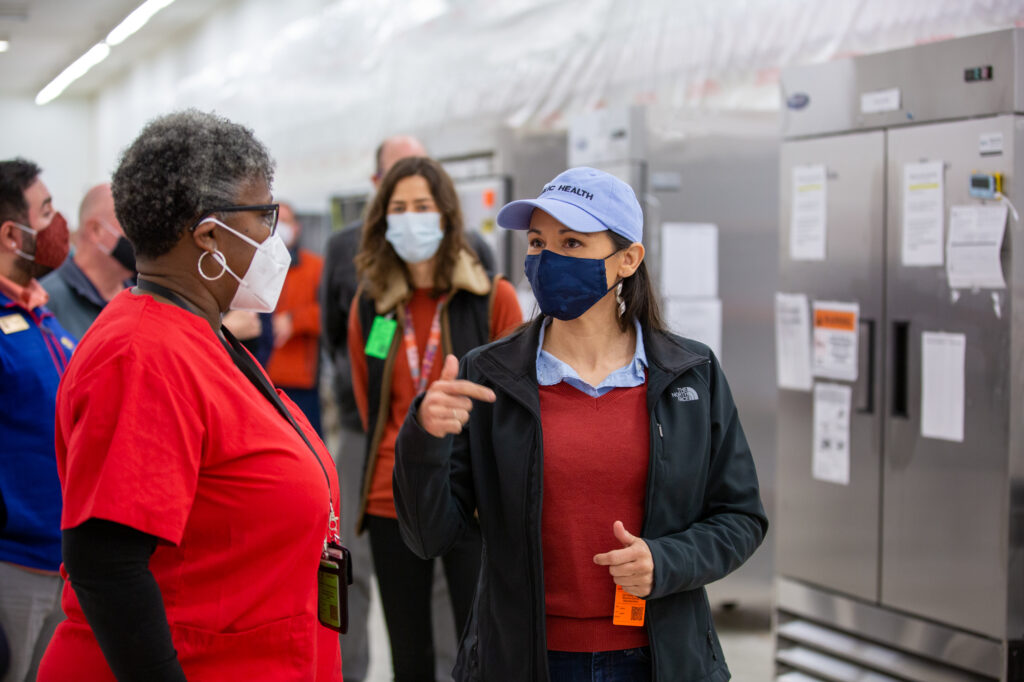
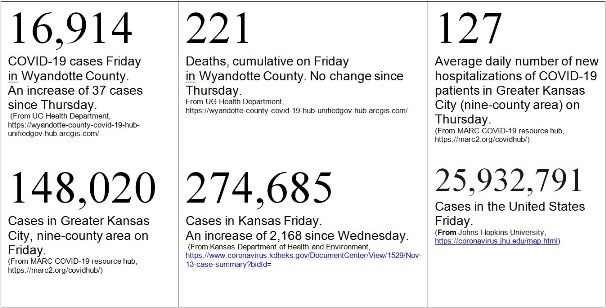
U.S. Rep. Sharice Davids, D-3rd Dist., touring the Unified Government Health Department vaccination clinic on Thursday, said she would advocate for more vaccines in the region.
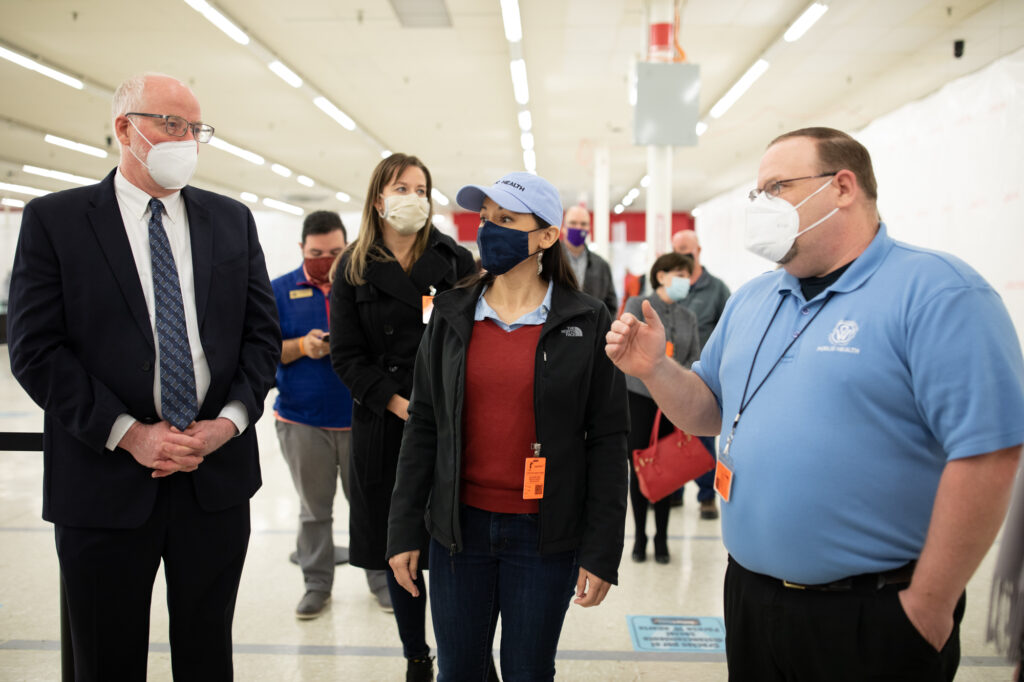
“It was incredibly encouraging to see the capacity Wyandotte County has to vaccinate folks thanks to the strong investments they’ve made in public health, but it’s clear that we need more vaccines if we are going to get this virus under control and keep our community safe,” Rep. Davids said. “The new administration is taking the right steps to ramp up vaccine production and distribution, and I’m hopeful that we are on the right path to increase available vaccine doses, as well as vaccination sites and health care workers able to administer vaccines. I will continue to do everything I can to get shots in arms as quickly as possible, including by pushing for a new COVID relief package that will fund the rapid distribution of vaccines.”
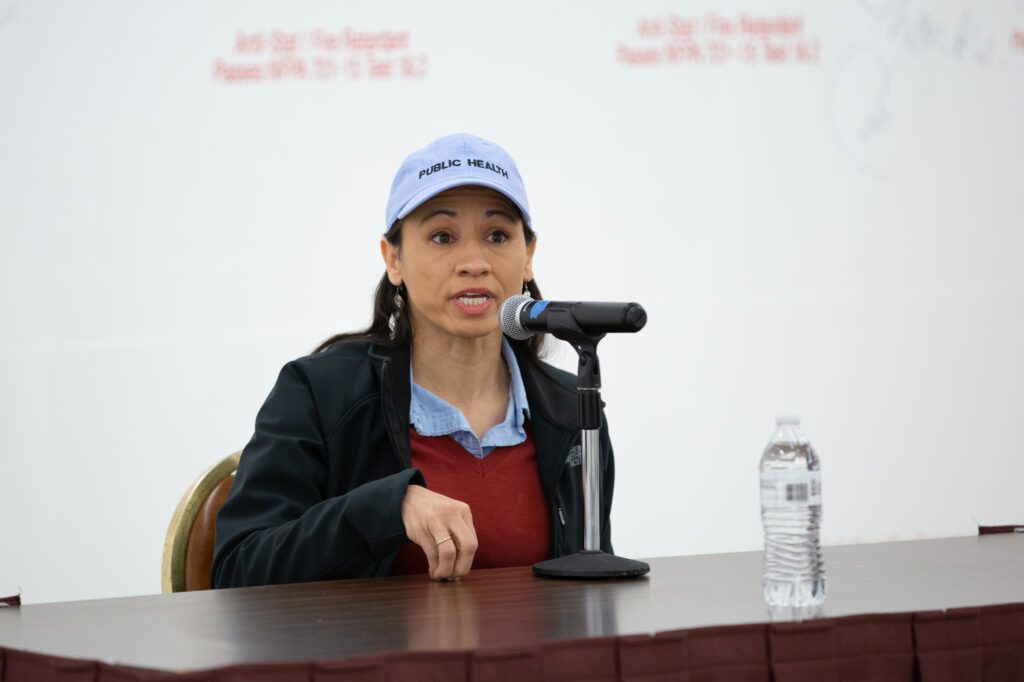
In addition to calling on leaders of Operation Warp Speed to increase vaccine production and distribution, Rep. Davids has been pushing for Congress to pass a new COVID relief plan that includes a robust vaccination and testing program.
President Biden recently released his proposed COVID relief package, the American Rescue Plan, which would create a national vaccination campaign to dramatically speed up the pace of inoculations by setting up community vaccination sites nationwide, scaling up testing and tracing, eliminating supply shortage problems, and more.
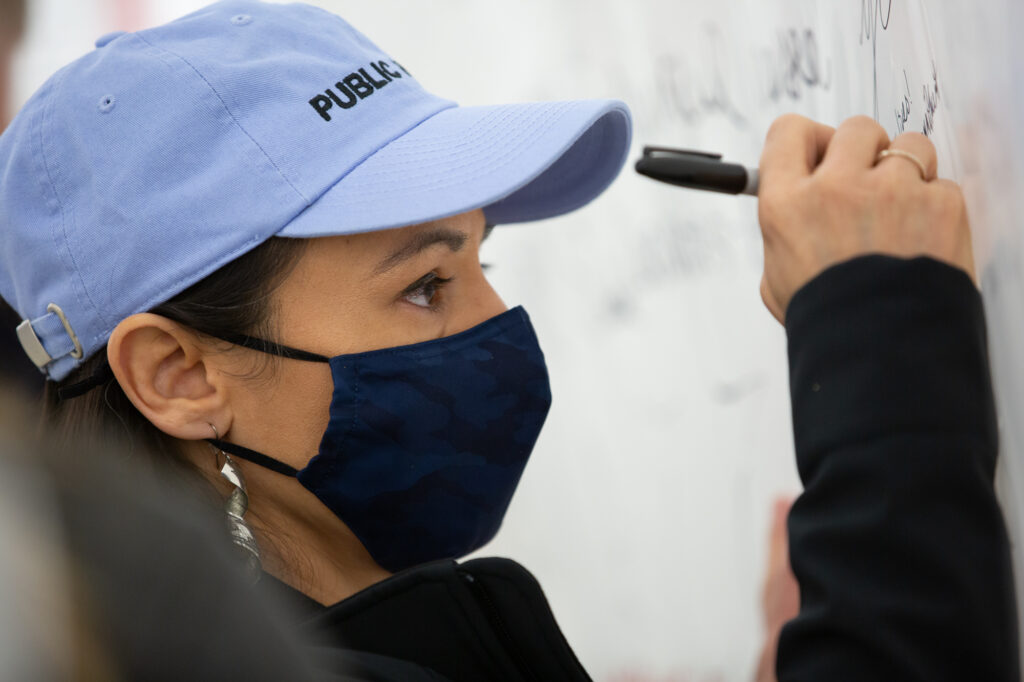
“I know everyone is anxious to return to some sense of normalcy – to have our children back in the classroom and our businesses up and running at full capacity – and we need better access to vaccines in order to do that,” Rep. Davids said. “In the meantime, we need to keep up wearing masks, practicing social distancing, and following public health guidelines. And when more vaccines are made available, we need folks to take them. It’s safe, effective, and our very best tool for combating this pandemic.”
New vaccines under development to provide more supply
Some new COVID-19 vaccines are expected to be coming out in the future, according to doctors at a news conference on Friday at the University of Kansas Health System.
Dr. Steve Stites, chief medical officer at the KU Health System, said Johnson and Johnson and Novavax are developing COVID-19 vaccines. He said Novavax has stated its vaccine’s effectiveness will be 90 percent for COVID-19, while it will be 48 to 50 percent effective against the South African variant.
Johnson and Johnson has released its data in a news conference and said its vaccine will be 72 percent effective with one shot and it will be 57 percent effective against the South African variant, Dr. Stites said.
There may be 7 million doses from Johnson and Johnson to the United States, and around 100 million in April, Dr. Stites said. There also could be about 100 million doses from Moderna around April.
Dr. Dana Hawkinson, medical director of infection prevention and control, said because of the variants that have been identified and isolated, that will mean people will probably need boosters of some sort.
Any effectiveness above 50 percent for a vaccine will be a good thing, Dr. Hawkinson said.
Dr. Stites asked if they could get 250 million doses, and could give them before May 1, should they just give first doses until they can give everyone a first dose. He said that is a currently a topic of discussion.
Dr. Hawkinson said he hoped that would become a short-lived issue, as more vaccines are approved, there would be more available.
Vaccines will have to receive emergency use authorizations from the FDA before they can be distributed. Johnson and Johnson stated it would apply for the EUA in early February, and vaccine would be ready to ship shortly after approval. (https://www.jnj.com/johnson-johnson-announces-single-shot-janssen-covid-19-vaccine-candidate-met-primary-endpoints-in-interim-analysis-of-its-phase-3-ensemble-trial)
Dr. Hawkinson said the first dose of vaccine develops the specific immunity to coronavirus, and the second dose makes the specific immunity more robust.
Amanda Cackler, director of quality and safety, said that there has been a noticeable drop in the absentee rate now that about 80 percent of the employees at the KU Health System have been vaccinated.
Dr. Stites said the current situation – the vaccine shortage – will change to a new situation in April and May, when they will have the vaccine available and need to get the vaccinations to the people as quickly as possible.
Cackler said KU Health System will be ready to give the vaccinations when vaccines come in. The KU Health System main campus in Kansas City, Kansas, and the Indian Creek campus in Johnson County have areas that have been designated for mass vaccine clinics.
Dr. Stites advised people to wear a mask, wash their hands, gather in small groups, stay in their bubble and stay home when sick.
“You want to be here when your call to arms comes, and it is coming,” he said.
COVID-19 case numbers reported
The University of Kansas Health System reported 50 active COVID-19 patients in the hospital Friday, a decrease of four since Thursday, according to Dr. Dana Hawkinson, medical director of infection prevention and control. There were 10 patients in the intensive care unit, one less than Thursday, and eight of the ICU patients were on ventilators on Friday, a decrease of one since Thursday. There were an additional 55 COVID-19 patients hospitalized who were out of the acute phase, an increase of four since Thursday. There were a total of 105 COVID-19 patients, the same as Thursday.
Wyandotte County reported an increase of 37 COVID-19 cases on Friday, Jan. 29, according to the Unified Government’s COVID-19 webpage. There were a cumulative 16,914 cases. There was a cumulative total of 221 deaths, the same as Thursday.
The Mid-America Regional Council’s COVID-19 dashboard reported 148,020 cumulative COVID-19 cases on Friday. There were 1,849cumulative deaths, and 127 was the daily average of new hospitalizations.
The state of Kansas reported 274,685 COVID-19 cases statewide on Friday, an increase of 2,168 cases since Wednesday, according to the Kansas Department of Health and Environment. There were an additional 61 deaths reported, with a cumulative total of 3,779.
The Johns Hopkins University COVID-19 dashboard on Friday night reported 25,932,791 cumulative cases in the United States, with 436,799 total deaths nationwide.
Free COVID-19 testing available Saturday
COVID-19 tests will be available Saturday, Jan. 30, at the Pierson Community Center parking lot, 1800 S. 55th St., Kansas City, Kansas. Hours are subject to change depending on the weather and other factors. These tests are through WellHealth Management. Appointments are required. For more information and to schedule a test, visit www.GoGetTested.com/Kansas.
The Unified Government Health Department’s COVID-19 test site at the former Kmart building at 78th and State will be open from 9 a.m. to 3 p.m. on Monday, Feb. 1. Appointments are not needed for tests. To see if there is any change to the schedule, visit https://www.facebook.com/UGHealthDept.
The UG Health Department recently added flu testing to the COVID-19 test at the Kmart building. Only one swab is used for the two tests. The Health Department estimates a two- to three-day wait for COVID-19 results. For the flu, the department only contacts people if it is positive.
Tests from the Health Department are free for those who live or work in Wyandotte County. The tests are nasopharyngeal swab tests. The Health Department no longer uses saliva tests.
The tests are open to asymptomatic people as well as those who have symptoms or have been exposed to COVID-19. Check with the UG Health Department’s Facebook page to see if there have been any changes in the schedule. Bring something that shows that you live or work in Wyandotte County, such as a utility bill.
Wyandotte County residents who are interested in getting a COVID-19 vaccine may fill out a survey form at the UG Health Department at https://us.openforms.com/Form/2f2bcc68-3b6a-450b-9007-d39819db6572. Residents will be contacted to make an appointment when vaccine becomes available.
Testing sites are at https://wyandotte-county-covid-19-hub-unifiedgov.hub.arcgis.com/pages/what-to-do-if-you-think-you-have-covid-19.
For more information about the testing site at the former Kmart location, visit https://alpha.wycokck.org/files/assets/public/health/documents/covid/10092020_newtestingsitewyco.pdf.
The KU doctors’ news conference is online at https://www.facebook.com/kuhospital/videos/2967528923530420.
.
The new health order on hours for bars and restaurants is at https://alpha.wycokck.org/files/assets/public/health/documents/localhealthofficerorder011221.pdf.
Information about the new health order on extended hours for bars and restaurants is at https://alpha.wycokck.org/files/assets/public/health/documents/covid/01112021ugissuesnewbarrestaurantorder.pdf.
The school health order is online at https://alpha.wycokck.org/files/assets/public/health/documents/covid/localhealthofficerschoolorder01042021.pdf.
A letter explaining the school health order is online at https://alpha.wycokck.org/files/assets/public/health/documents/covid/schoolletter_01052021_english.pdf.
To see information about the UG giving vaccines to health care workers, visit https://wyandotteonline.com/ug-to-start-giving-covid-19-vaccines-to-health-department-and-ems-personnel-next-week/.
The KDHE vaccine report is at https://www.kansasvaccine.gov/DocumentCenter/View/123/Vaccine-Historical-Document-12121?bidId=
Cards and letters of encouragement for caregivers at KU Health System may be sent to Share Joy, care of Patient Relations, 4000 Cambridge St., Mailstop 1021, Kansas City, Kansas, 66160. Emails can be sent to [email protected].
Wyandotte County is under a mandatory mask and social distancing order.
The UG COVID-19 webpage is at https://alpha.wycokck.org/Coronavirus-COVID-19-Information.
The KDHE’s COVID-19 webpage is at https://www.coronavirus.kdheks.gov/.
The KC Region COVID-19 Hub dashboard is at https://marc2.org/covidhub/.
The Wyandotte County page on the Johns Hopkins COVID-19 website is at https://bao.arcgis.com/covid-19/jhu/county/20209.html.

